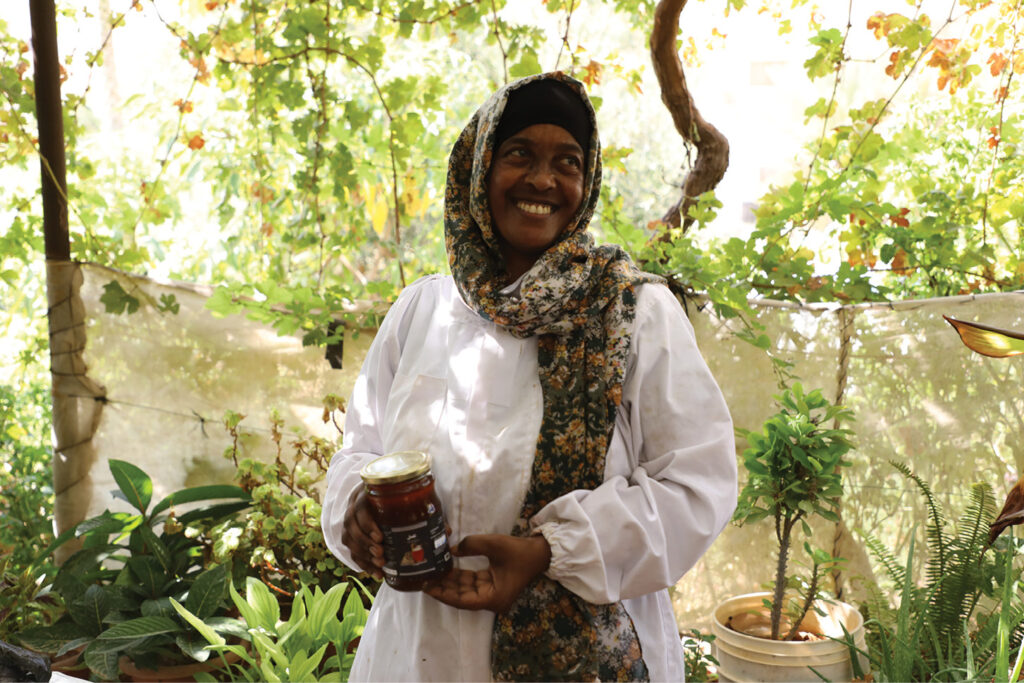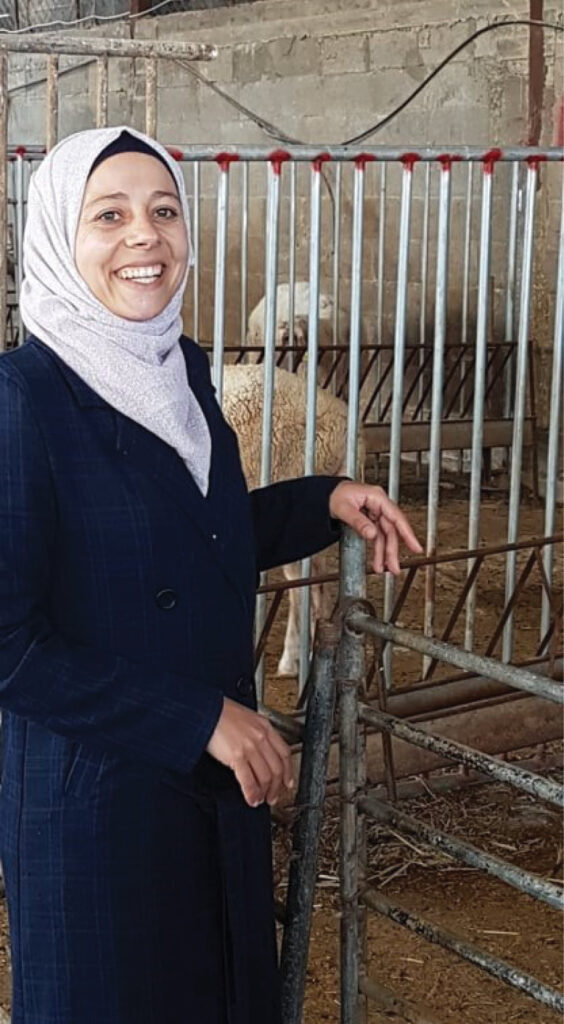Fatima Awatleh, Beekeeper – Nuyeimeh, Jericho Governorate
Fatima is a beekeeper and a leader in a women’s cooperative in Jericho, West Bank. The women in the cooperative call her “The Queen Bee” because she is not only a great beekeeper but has also managed to find new and innovative approaches to deal with bees and has come up with uncustomary bee produce, such as bee pollen and royal jelly. She describes her joy: “There are not many career opportunities in Jericho, and I am thrilled to be working in this field.”
Now, Fatima not only runs her business but also helps and trains other women in beekeeping, thus creating new job opportunities for the women of Jericho.

CARE supported Fatima and others in the West Bank within a project titled Rawasi, a program active across Area C of the West Bank and implemented by CARE International and the Agricultural Development Association (PARC) during the years 2013 to 2016. By strengthening capacities, linkages, and services at the household and institutional levels, the project established long-term structures that aim to protect livestock holders, especially women and the Bedouin, from devastation and shocks in an extremely fragile political and economic situation. Through interventions at the input level (water, fodder, and veterinary and extension services) and output level (production quality and marketing), the resilience of sheep and goat herders was strengthened, and their income sustainably increased.
The program has improved the livelihood and security of vulnerable Palestinians by implementing sustainable and market-oriented economic empowerment to bring about the highest and most meaningful impact for vulnerable Palestinians. Rawasi has introduced replicable, innovative solutions to mitigate the various challenges and constraints that face Palestinian livestock holders. The project was implemented through an integrated market-oriented approach that linked farmers, including women, with community-based organizations (CBOs), and targeted communities with different stakeholders, including cooperatives, governmental actors, and businesses. Rawasi also worked to strengthen the role of CBOs through capacity building that met their organizational needs and enabled them to adopt a market-orientated approach.
Aya Mleitat, Owner of a Sheep Farm – Beit Fureek, Nablus Governorate
Aya Mleitat, 30 years old, from the village of Beit Fureek, has always dreamed of changing the stereotypical image of women in her society. So she decided to take charge of her own life and work, to be the change she wanted to see. She is the first woman to establish her own farm in the village. She explains, “I always thought of what it takes for us women to challenge the traditions of our conservative community. Therefore, I decided to start my own project based on research and scientific evidence that are relevant to our environment and conditions.”
Starting with US$4,000, she built a small farm to raise sheep. Now the farm is worth US$30,000. When she embarked on her project, she did not know where to look for the right information or how to access the necessary funds.
With a BA in sociology, Aya had no clue about raising sheep. However, she worked hard to learn more and get funding. “I was worried and confused,” she admits. “I had no trust in any of the institutions until I met CARE’s field officers who were implementing Souqona project. They welcomed me, believed in me, and were very patient. Souqona shared the costs of introducing and installing metal dividers, automatic milkers, and incubators on my farm. Technology has raised the quality standards of my products.”

Through the project, Aya was provided with farm-management training and was linked to alternative markets. She still dreams of expanding her farm and transforming it into a natural reserve, integrating economics, sociology, and agriculture. Aya’s work is not limited to her farm; she is now sharing her experience with other women in other areas of the West Bank. Most recently, a group of 150 women from Jenin visited Aya’s farm to hear her story.
The support to Aya comes under CARE’s Souqona project. Souqona is a five-year project that was launched in April 2016, as part of the program “Palestinian Farmers Connecting to Markets,” funded by the Australian government, which constitutes the third phase of the Australian Middle East NGO Cooperation Agreement (AMENCA) Program in the oPt. The project seeks to improve vegetable, dairy, and seed farmers’ connection to the market. It is implemented in 23 locations across three governorates in the northern areas of West Bank (Nablus, Jenin, and Tubas).
The project works to improve the market system by developing the sheep and goat value chain and the vegetable value chain. By working with a wide range of stakeholders to address the production, marketing, and input constraints in the selected value chains, the project develops business models and case studies based on scientific demonstrations.
Souqona’s primary goal is to increase the income, agency, and market opportunities of female and male Palestinian farmers in the West Bank through growth in pro-poor agribusiness and market development. CARE partners with the Applied Research Institute – Jerusalem (ARIJ) and the International Center for Agricultural Research in the Dry Areas (ICARDA) to implement this project.


